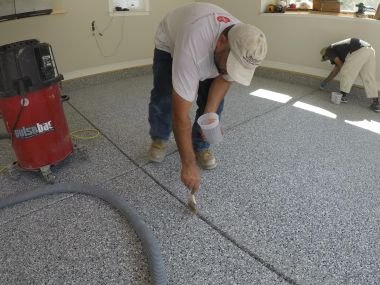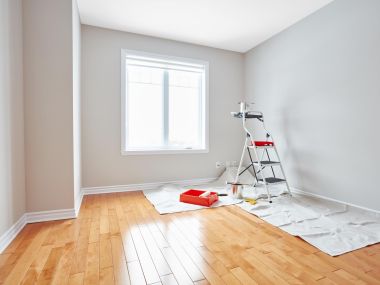Here’s Why Your Deck Stain Keeps Peeling

When the weather warms up and the days get longer, people begin gathering outdoors on their decks to soak it all in. But if you haven’t checked on your deck in a while, you might find that it’s looking a little worse for wear. If your deck stain is peeling, you might wonder what caused it and how to prevent it from happening in the future. Let’s explore why your deck stain keeps peeling and what you can do about it.
Importance of Deck Staining
Before exploring what causes deck stain peeling, let’s first understand the importance of deck stain and why peeling can be concerning.
Most decks are made of wood. Many homeowners choose this material because of its natural look, affordability, and availability. On the downside, wood is not the most durable deck material. It can fade, rot, and develop many other issues after constant exposure to sunlight and moisture. This damage can make your wooden deck look unsightly and unsafe.
A quality exterior stain creates a protective barrier from moisture, UV rays, and other environmental factors that can damage the wood over time. If the stain starts to peel, your wooden deck will be susceptible to damage that could shorten its lifespan. On top of that, a peeling deck stain isn’t aesthetically pleasing.
The lifespan of deck stain depends on various factors, such as the stain type, application timing, and environmental conditions. For example, transparent, semi-transparent, and semi-solid stains can last at least two years, while solid stains may last five years or more. If you’re asking, “Why is my deck stain peeling after two years,” it’s probably because it’s already on its last legs. Professionals actually recommend re-staining your deck every two to three years.
What to Know About Deck Stain Peeling
Wooden deck stains will eventually peel over time. However, peeling can also happen prematurely for many reasons. Re-staining a deck can be a lot of work. Learning about and avoiding the causes of why your deck stain is peeling will save you time, effort, and money associated with re-staining.
Improper Application
When it comes to painting and staining, the initial application is critical to how long the material will stick to the surface. It’s crucial to learn how to stain a deck or hire someone with experience. If applied incorrectly, even the best deck stain will loosen and peel away over time. However, improper application can occur in more ways than one. You might have used poor-quality materials or tools, for instance. Or you might have tried staining your deck during the wrong time of year or the wrong time of day. After all, if it's too cold, too hot, or too humid, your stain might not properly adhere.
For all these reasons, it's best to hire pros from the get-go. Hiring an expert will also help you get an idea of trendy deck stain colors.
Too Much Stain and Trapped Moisture
Deck stain can also be overapplied to a surface. Wood can only absorb so much stain. If too much stain is applied, the excess material will linger slightly above the surface and prevent moisture from rain and dew from leaving the wood. If this moisture can’t evaporate, it will remain on the surface and begin peeling away the stain.
Lack of Adhesion to the Surface
Even if the proper amount of stain is used, it may still peel away if it’s not sticking to the wood strongly enough. During application, this can occur in a few ways. First, if the deck is not completely dry or clean, the stain won’t adhere to the surface. Instead, parts of it will stick to debris and moist areas, which will eventually loosen the stain. If a previous coat of stain still remains, failing to remove it and sand the surface will also prevent the new coat from adhering. And, as previously mentioned, the environment in which you're staining can make or break your results.
Poor Maintenance and Lack of Sealant
Fluctuations in temperature, inclement weather, and other unavoidable scenarios will do damage to any deck over time. Still, there’s a lot you can do to protect your deck from harm and maximize the lifespan of your deck stain. If you don’t put in the effort to maintain your deck, its stain will peel away much quicker.
The easiest and most effective way to prevent your deck stain from peeling is to go over your deck with the proper sealant. Deck sealers essentially waterproof your deck, keeping moisture from contacting the surface directly. If you don’t bother to seal your deck, you’re leaving it vulnerable to rain, snow, sleet, dew, and other forms of moisture.
Re-staining Your Wooden Deck
Ready to make your old deck look like new again? Here’s how to re-stain a deck that is peeling:
Clean your deck: Start by clearing your deck of any accessories and furniture. Then, remove any debris and dirt on the surface and between the gaps. You can pressure wash to eliminate dirt and grime buildup.
Remove the stain: Scrape off as much of the old finish as you can. Afterward, apply a deck stripper over the boards and leave it for 15 minutes or until it’s soft enough to be scrubbed off. You can also sand the boards until smooth.
Re-stain your deck: Begin re-staining once the boards are completely dry. Stain the deck thoroughly, covering even the gaps and grooves. Make sure to read the manufacturer’s instructions.
Touch it up: You’ll be able to see areas you’ve missed once the stain dries. Touch up these missed areas with your brush.
Hire a Professional to Stain Your Deck
There’s a lot to learn about the ins and outs of deck maintenance and stain application. If you want to ensure that your deck will look great and hold up this spring and summer, hire a Raleigh painting company that offers deck staining and sealing services. Anderson Painting contractors specialize in all home improvement projects, not just interior and exterior painting. Our team can make your deck look as good as new and last much longer so that you don’t have to worry about going over it again and again. To learn more about us and our services, call Anderson Painting today at 919-610-1855 or email us at info@andersonpaintingnc.com! You can also request an estimate here.




